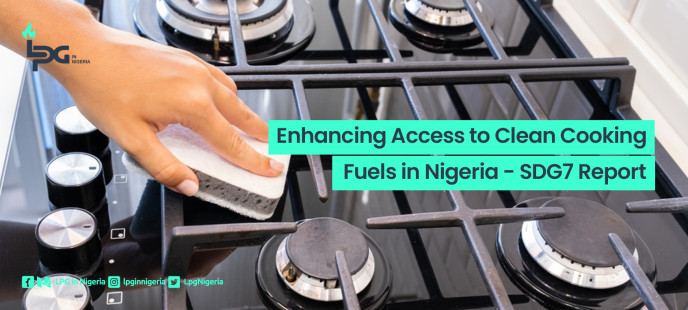- 3952
- 0
Sharing Ideas and Updates on LPG in Nigeria and related information to enable effective collaboration within the LPG Value Chain
Enhancing Access To Clean Cooking Fuels In Nigeria - SDG7 Report

In 2022, 74 percent of the global population had access to clean cooking fuels and technologies, up from 58 percent in 2010. However, 2.1 billion people still relied on polluting fuels, underscoring the urgent need for accelerated efforts to achieve universal access by 2030. If current trends persist, only 79 percent of the world's population will have access to clean cooking by 2030, leaving 1.8 billion people dependent on inefficient fuels such as wood, charcoal, and kerosene. Particularly concerning is that six out of ten people without access to clean cooking in 2030 will reside in Sub-Saharan Africa, with minimal improvement expected by 2050.
Eastern, South-eastern, Central, and Southern Asia have made significant progress, while Sub-Saharan Africa's access deficit has increased due to population growth outpacing improvements. Urban areas typically have greater access to clean cooking fuels compared to rural areas, but the gap is narrowing. From 2010 to 2022, urban access increased from 82 percent to 88 percent, while rural access rose from 30 percent to 54 percent.
In 2022, 60 percent of people in low- and middle-income countries (LMICs) used gaseous fuels like LPG and natural gas as their main cooking energy source. Unprocessed biomass was used by 26 percent, electricity by 8 percent, and charcoal by 4 percent. Coal and kerosene usage was minimal at 1 percent. Integrating electric cooking into broader electrification efforts can enhance energy security, manage fuel costs, and support global energy and climate goals.
Despite progress, the world is not on track to achieve universal access to clean cooking by 2030. Without significant acceleration, nearly 1.8 billion people will remain exposed to harmful cooking fuels. Sub-Saharan Africa's deficit is growing by nearly 20 million people annually, emphasizing the need for urgent action, especially in 44 countries, predominantly in Sub-Saharan Africa, which need an 8–12 percentage point annual increase in access to meet the 2030 target.
Nigeria can take several strategic steps to enhance access to clean cooking fuels and technologies, drawing from global insights and trends:
Promote and Subsidize Clean Cooking Fuels: The Nigerian government can subsidize clean fuels such as LPG, natural gas, biogas, and electricity to make them more affordable for the population. Additionally, removing value-added taxes (VAT) on these clean fuels can further reduce costs and increase accessibility.
Infrastructure Development: Investing in infrastructure to support the distribution and availability of clean cooking fuels across urban and rural areas is crucial. This includes building LPG plants, biogas facilities, and expanding the electricity grid to ensure reliable and widespread access.
Public Awareness Campaigns: Launching extensive public awareness campaigns to educate people about the benefits of clean cooking fuels and technologies can help drive adoption. These campaigns should highlight health benefits, cost savings, and environmental advantages.
Subsidize Clean Cooking Technologies: Providing subsidies or financial incentives for the purchase of clean cooking stoves and other related technologies can encourage households to switch from traditional, polluting methods to cleaner options.
Strengthen Policy and Regulatory Frameworks: Establishing strong policies and regulations to promote clean cooking fuels and technologies is essential. This includes setting national targets for clean cooking access and ensuring that these targets are integrated into broader energy and environmental policies.
Partnerships with Private Sector: Collaborating with private sector companies to develop and distribute clean cooking solutions can accelerate progress. Partnerships can facilitate investments in clean cooking infrastructure and technologies and promote innovative solutions tailored to local needs.
Support for Local Manufacturers: Encouraging and supporting local manufacturers to produce clean cooking stoves and related technologies can help reduce costs and create jobs. Local production can also ensure that technologies are adapted to local cooking practices and preferences.
Implementing Pilot Programs: Launching pilot programs in various regions, especially in rural areas, to test the effectiveness and scalability of different clean cooking solutions can provide valuable insights. Successful pilots can be scaled up to national levels.
Leveraging International Support: Seeking support from international organizations, such as the UN and World Bank, can provide additional funding and technical expertise to support clean cooking initiatives. Participation in global programs and initiatives can also align Nigeria with international best practices.
Monitoring and Evaluation: Establishing robust monitoring and evaluation frameworks to track progress, identify challenges, and adjust strategies as needed is essential for the success of clean cooking initiatives. Regular assessments can ensure that efforts are on track to meet targets and make necessary improvements.
Source: Tracking SDG 7: The Energy Progress Report 2024
















0 Comment.